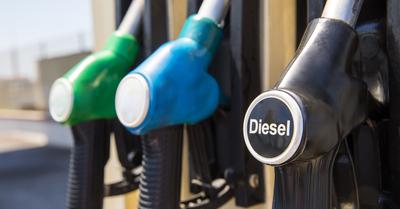Off-road diesel is often used by people who are looking for an alternative to regular diesel. But can you use off-road diesel in your truck safely?
There are two types of diesel that you can use for a truck; off-road and on-road diesel. While both are diesel fuels, it is important to know the difference between the two and whether or not you can (or even should) use off-road diesel in your truck.
Off-road diesel should not be used in trucks used for personal use, although it can be used by any vehicles that aren't driven on the road (for instance, construction equipment, tractors and even generators). Using off-road diesel in a vehicle that travels on roads is illegal.
The real question, though, is, will off-road diesel be bad for a truck? It is important to remember that off-road and on-road diesel are practically the same, apart from the former having red dye included in the mix. This is also why off-road diesel is often referred to as red diesel or dyed diesel. Here, we will take a quick look at what off-road diesel is and how you can use it for your truck.
As experienced truck drivers, who have used both on-road and off-road diesel fuel, we can provide you with all of the information you need regarding the use of off-road diesel for your truck.
This article may contain affiliate links where we earn a commission from qualifying purchases.
Off-Road Diesel – What Is It?
The majority of red diesel on the market now is ULSD. The EPA exemption that allowed for greater sulfur content has been removed as of 2014, and it'll only be a matter of time until all other forms of its use are either depleted and replaced.
If you've been using one type of gasoline for the past decade or so, you might not realize that the red diesel you're buying now has changed significantly.
Off-road diesel is not taxed, and given the recent increase in gasoline costs, it may be tempting to utilize tax-free fuel on public roads. However, before you start loading up on tax-free gasoline, keep in mind that using off-road diesel on public roads might result in hefty fines. Furthermore, if you do not record that you used this gasoline lawfully, you may lose tax exemptions.
It is important to note that only cars and equipment that do not operate on public roads and highways are allowed to use off-road diesel. A combine or skid steer can lawfully be powered by dyed diesel, but not the commercial vehicle that transports them. For their heavy machinery, farmers and construction companies typically utilize tax-free fuel.
Wondering where you can get dyed diesel? Red diesel is frequently supplied by major oil and gas distributors in locations where there is a significant concentration of enterprises that require it.
Using Off-Road Diesel in Your Truck
When a fuel inspector finds red diesel fuel, do you have a problem? It all depends on what you're going to use it for. Dyed fuel denotes the existence of fuel that is taxed significantly lower.
The use of red-colored diesel fuelother than home heating is unlawful and may result in tax evasion fines for the perpetrator. So, why does that happen?
On-road diesel and off-road diesel are practically the same thing. Ultra-Low Sulfur Diesel (ULSD) with just 15 ppm sulfur is required for new on-road vehicles. On-road diesel is frequently referred to as "clear diesel" since it is, well, clear.
Off-road diesel, on the other hand, is referred to as red diesel due to its red tint. The dye is intended to ensure that people do not mix up the different types of diesel, and it also enables quick testing to detect which type of diesel is being used in a vehicle.
The term "Red Diesel" stems from the specific dye known as Solvent Red 164 or Solvent Red 26 added to the fuel to distinguish it from regular diesel fuel.
Off-road diesel is designed for machines that aren't used on the road. Using off-road diesel in a vehicle that travels on roads is illegal and can result in high fines.
On the other hand, on-road diesel is permitted for use in automobiles on the road, as the name implies. This is the type of diesel that is sold at petrol stations. On-road diesel is necessary for any vehicle permitted for use on public roads in the United States.
Although technically possible, utilizing red diesel for personal use is prohibited. In other words, utilizing it for a personal truck or automobile means you're a criminal. Technically, it'd be considered tax evasion.
Off-Road Diesel Storage
Contrary to popular belief, off-road diesel also has an expiry date. That being said, off-road diesel fuel may be stored for 6 months to 1 year without substantial fuel deterioration if kept clean, cold, and dry. According to companies such as Exxon, diesel fuel may be kept for more than a year under specific conditions.
Another reason why you shouldn't use off-road diesel in a truck that's used for personal use (besides it being considered tax evasion) is because of the fact that red fuel is highly flammable.
The National Fire Code has classified off-road diesel as a Class II flammable liquid. This is mainly because a flammable fuel has a flashpoint below 100 degrees Fahrenheit. For those of you who don't know, the flashpoint of diesel ranges between 126 and 205 degrees Fahrenheit. As a result, it's classified as a Class II combustible.
What about Taxes?
Off-road diesel is not taxed since it is not utilized in vehicles that go on roadways. As a result, it is less expensive than on-road diesel. Although there is no performance difference between the two forms of diesel, off-road diesel is less expensive for enterprises that use off-road vehicles.
Also, an excise tax is levied on on-road diesel. You may use on-road diesel in off-road vehicles, but you'll be paying state and federal taxes on the gasoline that you don't need to.
The fine for unlawful use of colored diesel in states, such as Alabama, Ohio, Texas, Florida and Washington, as well as others, is $100 per gallon or $1,000 per infraction (a tank containing red diesel), whichever is larger. For example, if 10 gallons of this fuel are discovered in your tank, you will be fined $1,000.
Off-road diesel, often known as farm diesel or diesel for agricultural purposes, is diesel that is not subject to on-road fuel taxes. Diesel fuel used for agricultural purposes is tax-free. Taxes can be avoided if diesel is burnt on a farm and can be traced. In Oregon, farms can obtain clean diesel without paying any road fees.
It is frequently colored red to indicate that it is tax-free. Some farms may track their use of clear diesel in order to submit Federal road taxes for off-road usage. This is common practice in states such as Oregon, where the PUC for trucks over 26,000 GVW have to pay a weight mile tax rather than the normal per gallon state road tax.









